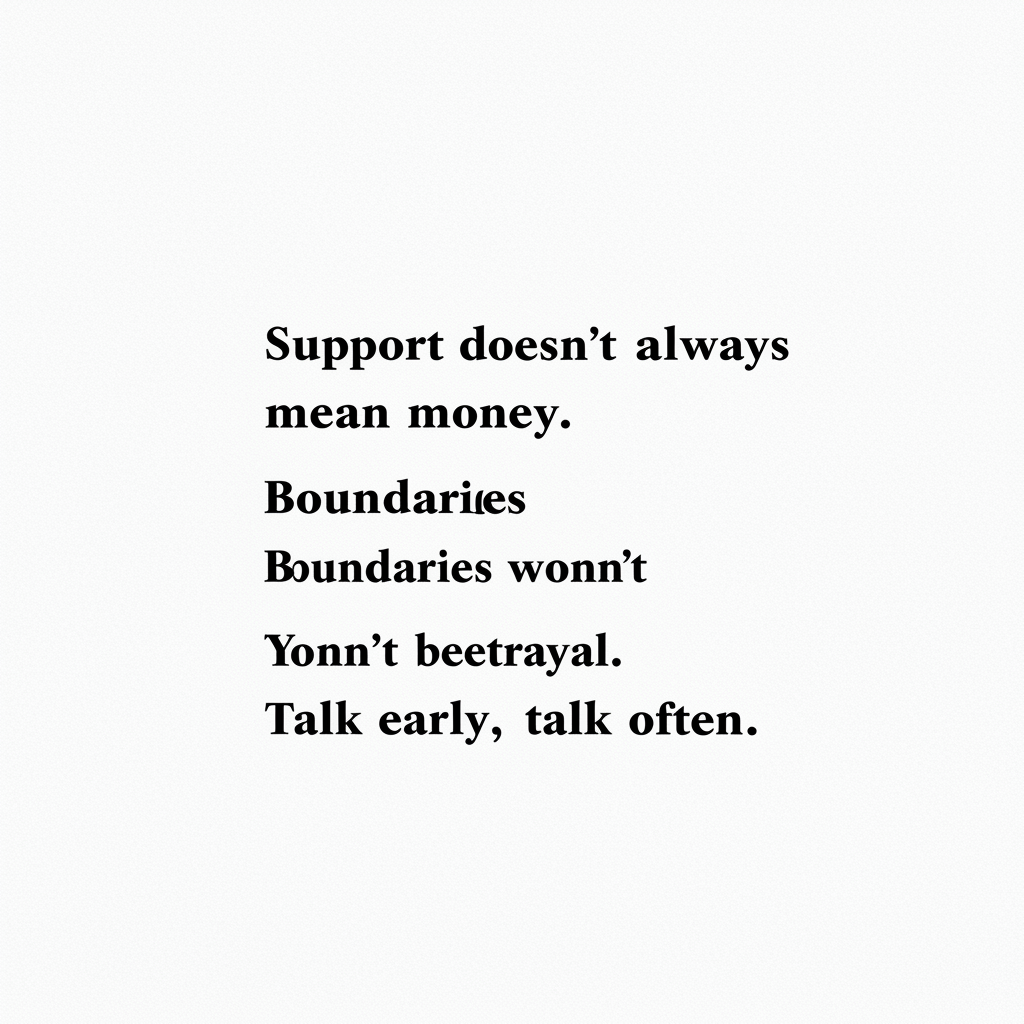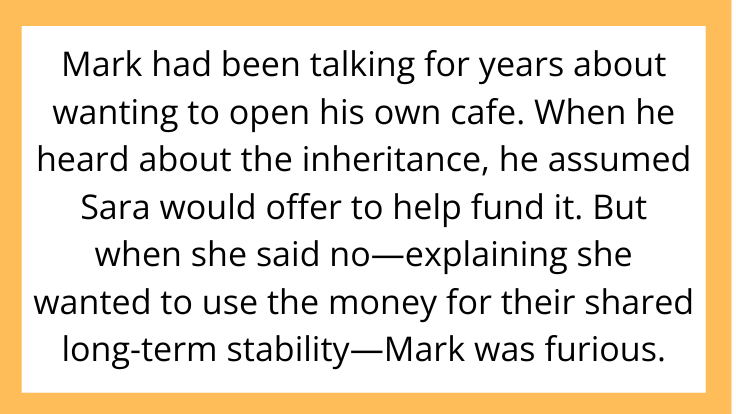AITAH for Not Letting My Husband Take My Inheritance to Start His Business?
Money, marriage, and family finances—combine them and you’ve got the perfect recipe for relationship conflict. In today’s AITAH scenario, we dive into a situation that’s got Reddit divided: When you inherit money, is it yours alone, or does it become shared with your spouse?
Let’s unpack this viral post and explore the lines between financial independence and marital partnership.
The Story: A Financial Dream or a Selfish Scheme?

A 34-year-old woman—let’s call her Sara—shared her situation on r/AITAH, and the responses were explosive. Sara recently received an inheritance of around $150,000 from her late grandmother, who left it to her specifically in her will. The money came with no conditions, and Sara decided to put most of it into savings for a future home, while keeping a small portion aside for emergencies.
Her husband, Mark, 36, had a different plan.
Mark had been talking for years about wanting to open his own cafe. When he heard about the inheritance, he assumed Sara would offer to help fund it. But when she said no—explaining she wanted to use the money for their shared long-term stability—Mark was furious.
He accused her of being selfish, unsupportive, and lacking faith in his dreams. According to him, married couples should share everything, including unexpected windfalls.
Sara turned to Reddit to ask: AITAH for refusing to give my husband money from my inheritance?
The Dilemma: Is Inheritance Shared Property in Marriage?

Sara’s Perspective: A Gift to One, Not Both

Sara’s main argument was that the inheritance was left to her personally. It wasn’t earned jointly, and it wasn’t something they had planned for together. It came from her grandmother, who had been very close to her growing up. She felt a responsibility to use the money wisely and with intention.
She wasn’t against Mark pursuing his dream—but she didn’t think this inheritance should fund it. Cafes are risky ventures, and she felt it was smarter to wait, save, and explore small business loans instead of gambling her grandmother’s legacy.
Sara also pointed out that Mark had not contributed financially to their relationship in equal measure—she had always been the primary earner and saver. The idea of draining her inheritance for a business that might not succeed felt reckless and one-sided.
Mark’s Perspective: Marriage Means Unity

Mark believed that when two people are married, there shouldn’t be “mine” and “yours”—only “ours.” He felt betrayed that Sara didn’t even consider helping him get his dream off the ground. In his eyes, this wasn’t just about money—it was about support, trust, and shared goals.
He argued that Sara didn’t believe in him or their future as business owners. He saw her refusal not just as financial prudence but as a lack of commitment to his aspirations.
What Reddit Had to Say

Reddit’s AITAH community was quick to weigh in—and overwhelmingly, they sided with Sara.
Top comment:
“Not the villain. Inheritance is separate property unless you choose to share it. Wanting financial security doesn’t mean you don’t love or support your spouse.”
Many users pointed out that small businesses—especially cafes—fail at an alarming rate, and using inheritance money without a solid plan or business background would be a huge risk.
Others addressed the emotional manipulation in Mark’s reaction:
“Dreams are great, but demanding your spouse fund them isn’t love—it’s entitlement.”
A smaller portion of commenters, however, sympathized with Mark, suggesting that Sara could have at least explored the idea further or helped him with a business plan.
“You’re married. It’s not crazy for him to hope for help from you. But ultimately, no one is entitled to someone else’s inheritance.”
Legal vs. Emotional Reality of Inheritance in Marriage

Legally:
In many jurisdictions, inheritance is considered separate property unless it’s commingled—meaning, it’s mixed with shared marital assets (e.g., using it for joint purchases or depositing it into a shared account).
Emotionally:
Expectations can be messier. Many people view marriage as a full partnership. When one partner keeps money separate, the other might interpret it as a lack of trust or long-term commitment.
This is where communication and mutual understanding are key.
Navigating Money and Marriage: Lessons from This AITAH Post

Whether you agree with Sara or Mark, there’s no denying that this situation highlights a few core truths:
1. Talk About Money Early and Often
Financial compatibility is one of the top indicators of relationship success. Discussing expectations around windfalls, debts, and financial goals before they become conflicts is essential.
2. Respect Boundaries Around Personal Property
Inheritance is often emotional. Pressuring someone to part with a gift from a loved one—especially if there’s no clear plan—can damage trust.
3. Support Doesn’t Always Mean Financial Support
Sara may have said no to funding Mark’s dream—but that doesn’t mean she doesn’t support it. Emotional encouragement, helping with a business plan, or researching grants and funding alternatives are all valid ways to contribute.
Final Verdict: Not the Villain, but Not Without Complications

Sara isn’t the villain here. She’s protecting a legacy and making a choice she feels is right for their future. But that doesn’t mean her marriage is off the hook. The disagreement signals a deeper conversation they need to have—about trust, goals, and what it truly means to share a life.
Mark isn’t inherently wrong for dreaming—but demanding money and attaching it to love and support? That’s where things went off track.



